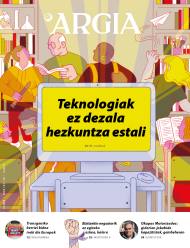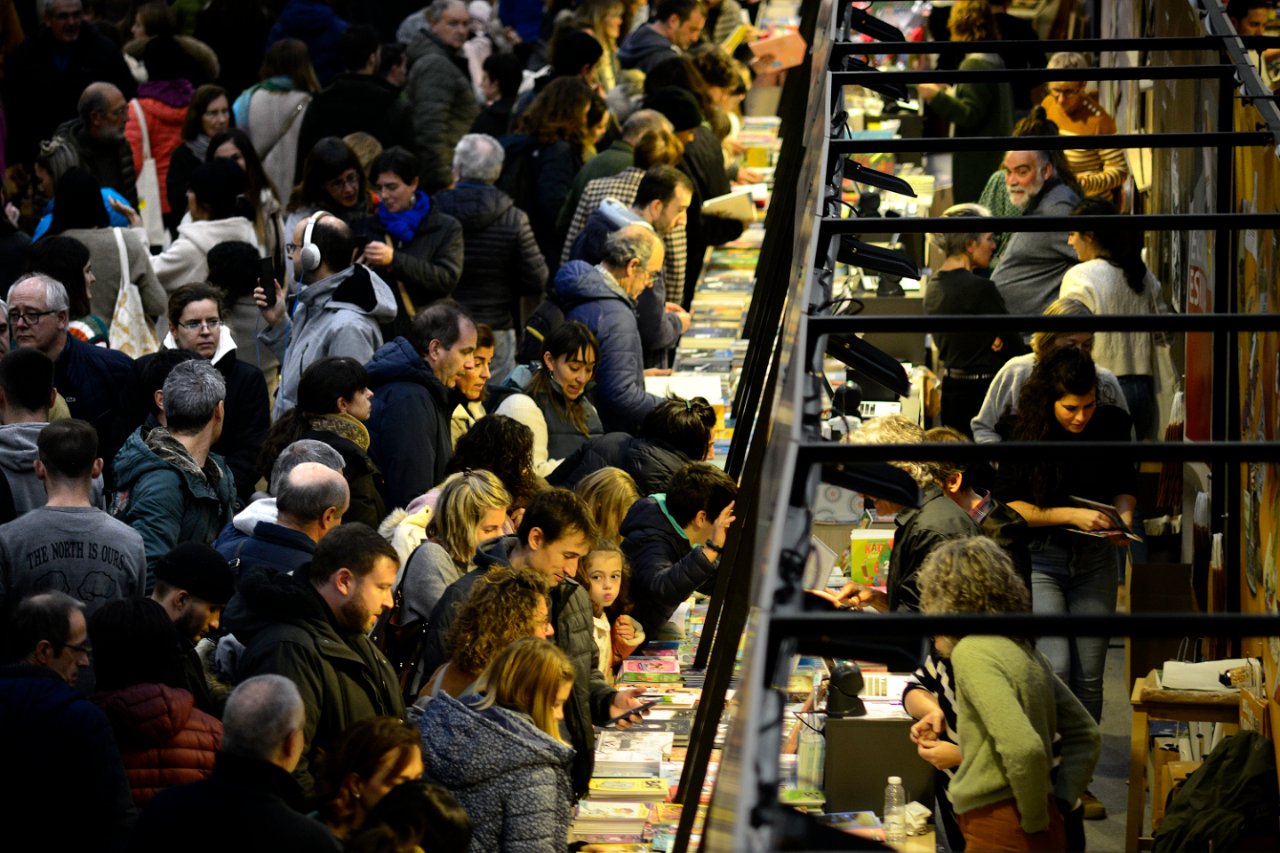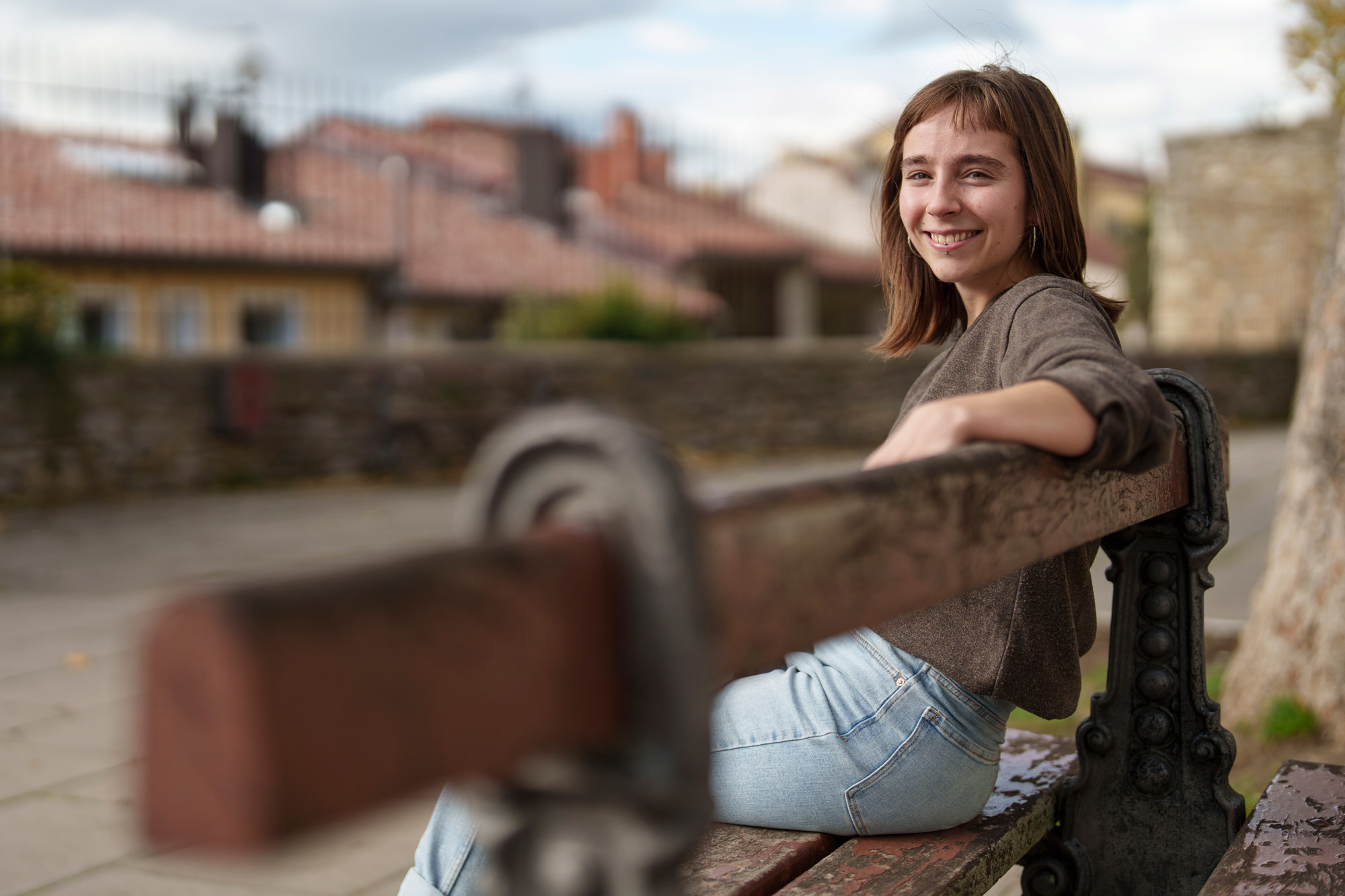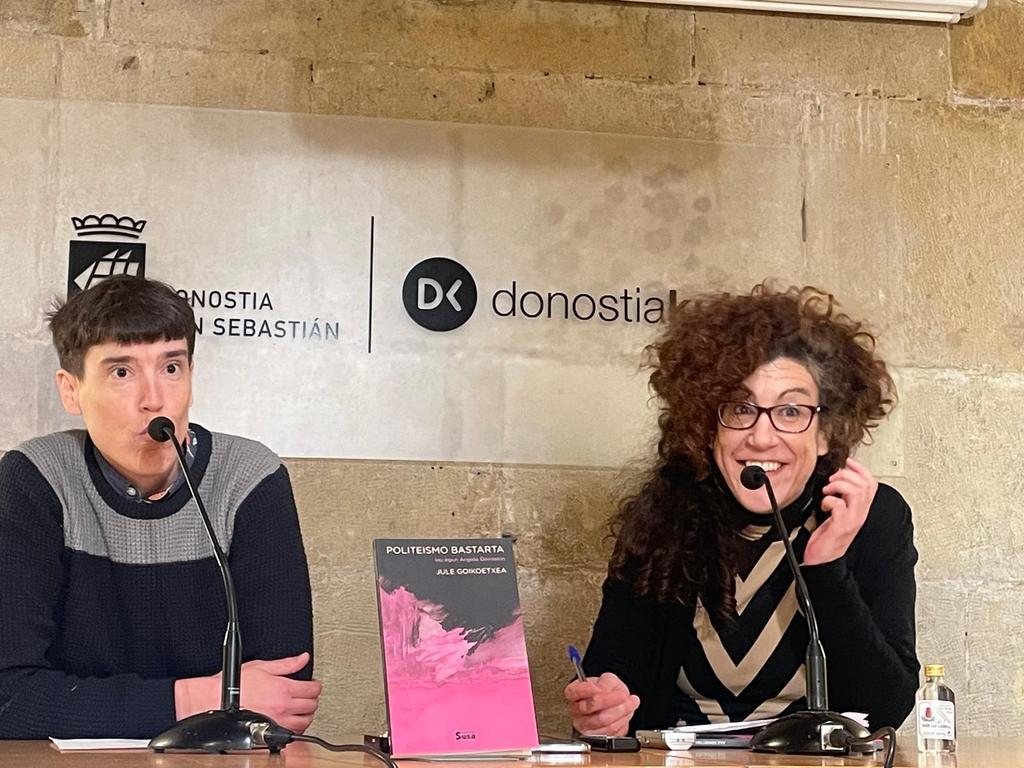From chair to chair, fly and Jenisjoplin, from throat opposite to store
- On this occasion we will focus on the work of Uxue Alberdi. In this first article we will take into account stories, novels, essays and chronicles for adults. We will talk about anecdotes, stories, philosophy books and written verses illustrated in a second article.

Uxue Alberdi is a learning journalist, bertsolari and writer famous for her rare presentation. He has been told that Bertsolarism allows him to play and experiment with language, that the tablate is given to the public and that the car trip spends time with other bertsolaris. That is, Bertsolarism allows it to occupy the public space and the plaza. Writing allows you to look inwards and look for language accuracy and correctness. In principle, writing is a kind of exercise in solitude. His work is marked by the use of the word in two disciplines. If the father is a professor of Euskera and the mother sells books, we could say that he has received much of his relationship with language and literature.
We will focus on his literary trajectory and analyze in the article (other works, next) prose works for adults. Its journey is long and wide. Long, as he published his first book in 2007, and these are passages since almost two decades. Zabala, because Alberdi's works are composed of different materials.
With the excuse of the story book A Snow Chair, we received the
visit of Uxue Alberdi in high school. If I have to tell the truth, I don't remember much from that first reading of the book, but I remember how I was fascinated by the way I talked about the writer I was facing. Since that morning I have followed the trail to Alberdi and as soon as I have published most of his books I have swallowed them. And yes, then I read the book A Chair in the Snow. It made me an impression. The book is composed of stories located in Sweden and some of the common lines of the book are images of white and cold landscapes. Climatological coldness is used both in social coldness and inside characters in a cold (and aseptic) world. to speak. The book welcomes us with a raw story, and I think it's very aged. And I don't remember the game that Bon Jovi plays, but I encourage you to read again. In my current reading, I've also felt cold, loneliness and pain.
The game of armchairs (Elkar, 2009) is the next novel he published. It is a novel that I love and that I have to acknowledge has had an excellent welcome in the groups of readers that I have programmed (the 21st edition has just been published). However, if we look at the bridge of literature (Armiarma website), this short novel is the one that received the least impact from critics and the least critical it accumulates. The armchair game is a metaphor for life and death, as every old man who dies leaves the cafeteria chair empty. And these cafeteria orders are the reason to stay alive until we talk about the past. It is a short novel with women protagonists, easy to read and sometimes emotional.
After these two books, and after the first birth, Euli-Giro (Susa, 2017) is a book written every two hours. This is what the author told in an interview with Juan Luis Zabala for Berria. Others believed she was going to be a mother, and that's why she wrote more freely. It was a book written in reaction to the reception received from the literary environment of the time. After being a mother, she felt the need to show herself and the world as a bertsolari and writer. They are stories darker than the previous two books, born of a sensation and that generate sensations: discomfort, restlessness... They are very realistic, although they have a lot of absurdity or confusion. When I read it I remembered the book Olatz Mitxelena Arrain hezur bat eztarria. Despite being so different, I have had similar sensations.
The fourth book contains a chronicle of three decades of 1980 in Jenisjopli (Susa, 2017). A landscape linked to conflict: armed struggle, militancy, prison, drugs. Patriarchy. But composed of human characters: disease, vulnerability, pleasure, pleasure and beauty. They mix epicity and routine. With this combination, especially with epicity, the book received, on the one hand, the preference for male criticism with authority. Alberdi himself acknowledged that only after the book was published was he felt for the first time a true writer. And with this combination, especially with everyday life, the book also acquired the interest of readers, as it is dynamic and allows for reflection. In this fourth book, criticism and readers joined the idea that this is a round book.
The book Aurkarritik (2019), published in the feminist collection Lisipe of the editorial Susa, is an essay based on testimonies, as Svetlana Aleksvic did in his book Guerra has no red women (Elkar, 2014), Alberdi has collected fifteen testimonies to illustrate women’s discourse on violence in the world of Bertsolarism. At the same time, as the author himself says in the introduction, “it aims to help expand and complete the traditional definition of bertsolarism” (books). Although it generated many uncomfortable silences, it was a brave and necessary proposal from love. Some women of bertsolaris managed to give voice to this collective and shared reflection in a didactic and correct manner. With this book he won the well-deserved 2020 Euskadi Prize.
Escaping the breath of male gaze, the book Dendaostekoak (Susa, 2020) is the most difficult to classify in all. The author has called it a hybrid. I would say that the autobiography is collective and chronic material. However, the writer has managed to do a complex and profound work. The story narrated from the voices of Marijo and Izaskun, mother and aunt, has its epicenter in the Pitxintxu store, formed by the window that gives to the street, the store itself and the backdrop it gives to the river. The book gives a political dimension to what is considered post-store, intimacy, on the one hand because precisely named and treated as important the things that are considered the things of women (sewing styles, embroidery, types of fabric or menstruation, rape or abortion). On the other hand, because Alberdi receives the look (and voice) of two strong, free, decisive and silent women. Because, as sisters, they have lived with weakness (and the road to Karakate).
Lumbung (Txalaparta, 2022) and Bozoak eta gero (Consonni, 2023) have also participated in a story.
As I said at the beginning, Uxue Alberdi has carried out an extensive and extensive literary career. The literary system took him as a young writer, but today he is a writer who has sought his own voice. Each published text is original. It has created a rich work in tone and form. And he's looked at small, important things. It has demonstrated ability and ability to open worlds with words.
Joan Tartas (Sohüta, 1610 - date of unknown death) is not one of the most famous writers in the history of our letters and yet we discover good things in this “mendre piece” whose title, let us admit it from the beginning, is probably not the most commercial of the titles... [+]















ilbeltza-(1).jpg)









.jpeg)